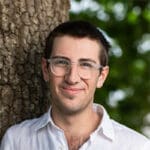Providing global opportunity through microfinance

2 May 2025 at 9:00 am
Annie Wang started her career in commerce, earning her degree at Queen’s University, Kingston in Canada and then worked as a management consultant at Oliver Wyman. While she valued the strategic problem-solving, she was drawn to global health, where she could apply systems thinking to address complex challenges. A pivotal moment was living in Sierra Leone during the Ebola epidemic, where she helped establish the Clinton Health Access Initiative office in Freetown. Her journey has spanned roles at IQVIA, the World Bank, and Roche Genentech. Each of these roles has shown Annie what is possible when we improve healthcare in underserved areas and low-income communities.
Read on for our interview with Annie!
A Typical Day of Work for Annie:
A typical day in global health means juggling time zones, diverse partners and collaborating with colleagues around the world. We work with mission-aligned, locally led partners who are deeply embedded in the communities they serve. My mornings usually start with Zoom meetings, connecting with partners and colleagues in Asia, Africa, and Latin America. While Opportunity has been a pioneer of microfinance for nearly 50 years, tackling health is a new frontier for our global network. I lead our global health strategy, ensuring that our health finance, community health education, and health entrepreneurs programs are both impactful and sustainable.
Building relationships with governments, non-profits, and the private sector is also essential to ensure our health initiatives are integrated into local systems. I’m focused on identifying innovations that can improve healthcare access for women and girls, particular those in rural and hard to reach communities. Global health work is complex, but it’s incredibly rewarding to see strategic plans become real-world solutions.
The Biggest Challenge I’ve Encountered:
It’s easy to approach global health challenges with wide eyes thinking there is a silver bullet, or that the solutions are simple, but we just need more money. In reality, structural inequality compounds health challenges, and the diseases and health issues that are prevalent represent and reflect social challenges.
Why is it that people living in poverty are more likely to get sick? Why are women less likely to seek treatment and more likely to die from preventable causes?
It takes a concerted effort not to just look at the disease or health challenge in front of you, but to look deeper at the root causes. Building wellbeing and resilience by improving primary healthcare systems and addressing systemic inequality is much more complex than some of the simple fixes often touted in health. We need to take an integrated and systems-based approach if we want to truly solve our biggest health challenges.
If I Could Go Back in Time:
Early in my career, I was eager to see fast results and focused on implementing practical solutions to the diseases in front of me. However, over time I’ve seen that how impactful a disease is, has nothing to do with how deadly it is, it’s how we deal with it as a society. As Paul Farmer said: “If access to healthcare is considered a human right, who is considered human enough to have that right?”
I would tell myself that it is better to take a broad approach to how we address ill health and disease and ask some of the harder questions about barriers to health access for the most marginalised. I would also tell myself that it is important to have people represented in the room, when you are developing health solutions for them, to ensure you’re hearing their needs and understanding their health challenges and what they stem from.
How I Unwind After Work:
After work, I tend to seek out quiet and centring activities to unwind and recharge. I practice vinyasa yoga and meditation daily, which help me to slow down and refocus. From time to time, I do silent meditation retreats, allowing me to completely disconnect. I love to cook and host friends at home.
I also love reading both fiction and non-fiction, as it gives me a chance to reflect and slow down. My husband and I also foster kittens—tiny creatures that bring us a lot of joy and keep us busy and sometimes make for interesting zoom calls when I’m working from home.







